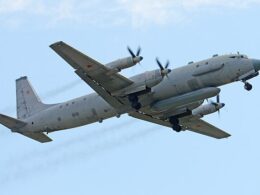An international investigation has uncovered a pattern of systematic Russian espionage in the Baltic and North Sea. Russian research vessels, often carrying armed military personnel, are routinely monitoring critical infrastructure such as gas pipelines, data cables, wind farms, and military installations in European waters.
As reported by Dutch research platform Pointer, which conducted the investigative research in collaboration with journalists from six European countries, the research team analyzed data from 72 ships, including intercepted Morse code messages and AIS signals from hundreds of voyages since the start of the Russo-Ukrainian War.
The findings reveal that these vessels frequently exhibit suspicious behavior within the exclusive economic zones of various European nations. They often sail at extremely slow speeds, follow erratic patterns, or come to complete stops near sensitive areas.
While officially designated for research or rescue operations, these ships appear to serve a dual purpose, engaging in military reconnaissance and potentially preparing for sabotage activities.
NATO officials have expressed growing concern about this trend, viewing it as part of a broader pattern of threats against Western countries. The presence of Russian Spetsnaz units, known for their expertise in reconnaissance and sabotage, on some of these vessels further heightens these concerns.
According to James Appatharui, Assistant Secretary-General at NATO, they are ''mapping all of our critical infrastructure with very sophisticated equipment, with the goal of sabotaging it.”
“In the past six months, we have seen an increase in threats against our countries. Including sabotage, political interference, disinformation, cyber attacks, forced migration and attacks on critical submarine infrastructure. They are all part of a pattern we must defend against. We are doing a lot, but we are not yet adequately prepared,” Appathurai said.
Furthermore, a former crew member of research ship Sibiryakov told the research team that Russia views critical infrastructure from a strategic point of view. If you destroy the submarine pipelines “in case of war, you have an advantage. Therefore, the immediate function of the research ships is to scan the seabed and provide information to the military.”
Despite the apparent threat, current maritime law allows these ships to operate freely in international waters, leaving European navies with limited options beyond shadowing the vessels.
Some European politicians are calling for more assertive responses to these intrusions, suggesting that merely observing is insufficient. They advocate for actively hindering these operations or even boarding suspicious vessels, citing the need to demonstrate vigilance and deterrence.
These findings seem to correlate to a previous investigation conducted in June 2024, when Flemish and Dutch journalists revealed that non-military Russian ships have been spying on pipelines and cables in the North Sea for years, and the espionage is happening on a much larger scale than previously known.
Related:
- Russian GRU’s sabotage recruitment in Baltics exposed by journalists
- Moscow-backed church’s priest accused of spying for Russian military intel in Kharkiv Oblast
- WSJ: Vienna has become major Russian spy hub for anti-Western operations in Europe
- Russian think tank’s “relocant” pitch clashes with unmasked spy couple in Slovenia
- Polish court convicts 14 Ukrainians, Belarusians, Russians of spying for Russia
- Belgium uncovers Russian civilian ships’ spying on North Sea infrastructure for years





